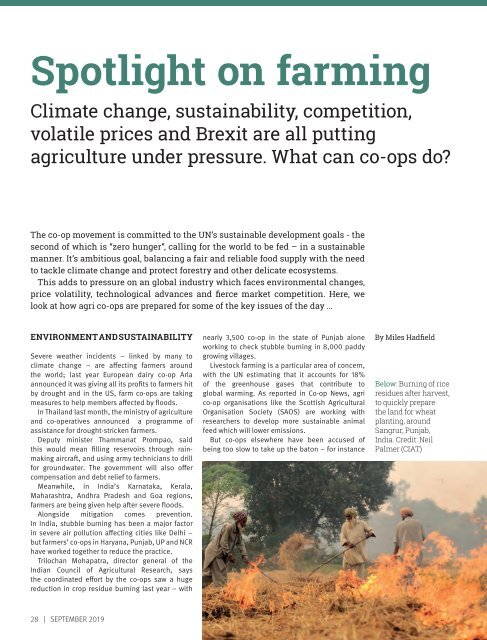Co-op News September 2019: Agriculture
How are co-ops working agriculture?
How are co-ops working agriculture?
Create successful ePaper yourself
Turn your PDF publications into a flip-book with our unique Google optimized e-Paper software.
Spotlight on farming<br />
Climate change, sustainability, competition,<br />
volatile prices and Brexit are all putting<br />
agriculture under pressure. What can co-<strong>op</strong>s do?<br />
The co-<strong>op</strong> movement is committed to the UN’s sustainable devel<strong>op</strong>ment goals - the<br />
second of which is “zero hunger”, calling for the world to be fed – in a sustainable<br />
manner. It’s ambitious goal, balancing a fair and reliable food supply with the need<br />
to tackle climate change and protect forestry and other delicate ecosystems.<br />
This adds to pressure on an global industry which faces environmental changes,<br />
price volatility, technological advances and fierce market competition. Here, we<br />
look at how agri co-<strong>op</strong>s are prepared for some of the key issues of the day ...<br />
ENVIRONMENT AND SUSTAINABILITY<br />
Severe weather incidents – linked by many to<br />
climate change – are affecting farmers around<br />
the world; last year Eur<strong>op</strong>ean dairy co-<strong>op</strong> Arla<br />
announced it was giving all its profits to farmers hit<br />
by drought and in the US, farm co-<strong>op</strong>s are taking<br />
measures to help members affected by floods.<br />
In Thailand last month, the ministry of agriculture<br />
and co-<strong>op</strong>eratives announced a programme of<br />
assistance for drought-stricken farmers.<br />
Deputy minister Thammanat Prompao, said<br />
this would mean filling reservoirs through rainmaking<br />
aircraft, and using army technicians to drill<br />
for groundwater. The government will also offer<br />
compensation and debt relief to farmers.<br />
Meanwhile, in India’s Karnataka, Kerala,<br />
Maharashtra, Andhra Pradesh and Goa regions,<br />
farmers are being given help after severe floods.<br />
Alongside mitigation comes prevention.<br />
In India, stubble burning has been a major factor<br />
in severe air pollution affecting cities like Delhi –<br />
but farmers’ co-<strong>op</strong>s in Haryana, Punjab, UP and NCR<br />
have worked together to reduce the practice.<br />
Trilochan Mohapatra, director general of the<br />
Indian <strong>Co</strong>uncil of Agricultural Research, says<br />
the coordinated effort by the co-<strong>op</strong>s saw a huge<br />
reduction in cr<strong>op</strong> residue burning last year – with<br />
nearly 3,500 co-<strong>op</strong> in the state of Punjab alone<br />
working to check stubble burning in 8,000 paddy<br />
growing villages.<br />
Livestock farming is a particular area of concern,<br />
with the UN estimating that it accounts for 18%<br />
of the greenhouse gases that contribute to<br />
global warming. As reported in <strong>Co</strong>-<strong>op</strong> <strong>News</strong>, agri<br />
co-<strong>op</strong> organisations like the Scottish Agricultural<br />
Organisation Society (SAOS) are working with<br />
researchers to devel<strong>op</strong> more sustainable animal<br />
feed which will lower emissions.<br />
But co-<strong>op</strong>s elsewhere have been accused of<br />
being too slow to take up the baton – for instance<br />
By Miles Hadfield<br />
Below: Burning of rice<br />
residues after harvest,<br />
to quickly prepare<br />
the land for wheat<br />
planting, around<br />
Sangrur, Punjab,<br />
India. Credit: Neil<br />
Palmer (CIAT)<br />
28 | SEPTEMBER <strong>2019</strong>


















